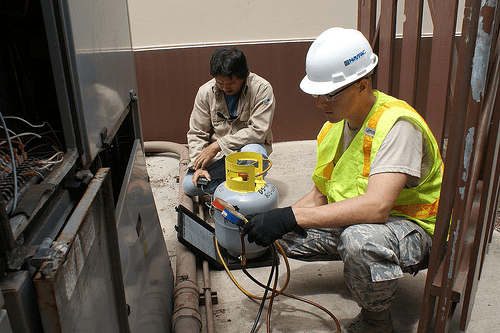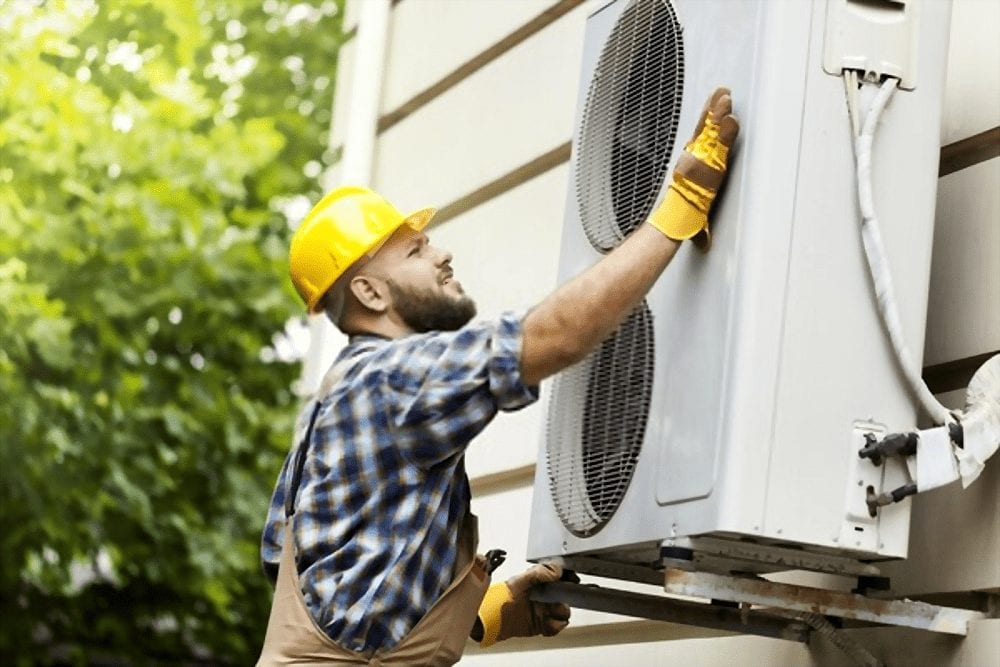Smart Strategies to Make the Most of Your New furnace replacement
Smart Strategies to Make the Most of Your New furnace replacement
Blog Article
Picking Between a Heatpump and Furnace: Key Considerations for Your Heating And Cooling Demands
When evaluating home heating alternatives for heating and cooling requires, the decision between a heatpump and a heating system can be complicated. Each system offers distinct advantages tailored to specific climates and energy performance objectives. Recognizing these distinctions is important for making an educated choice. Trick aspects such as installation prices and ecological impact better make complex the option procedure. Which alternative absolutely straightens with one's comfort and sustainability choices? The complying with sections will certainly discover these considerations in detail.
Understanding Warm Pumps: How They Function and Their Advantages
While lots of homeowners think about numerous heating options, recognizing how heatpump function and their advantages can greatly influence their decision. Heat pumps run by moving heat instead of creating it. In the winter months, they extract warm from the outdoors air or ground and move it inside, while in the summer, they reverse this process, cooling the home by eliminating warm outside. This twin performance makes them functional for year-round climate control.One of the main benefits of warm pumps is their power efficiency. They use considerably less power contrasted to typical furnace, possibly resulting in lower utility expenses (furnace replacement). In addition, warmth pumps have a smaller sized carbon impact, making them an eco-friendly selection. They also require less maintenance than conventional systems, contributing to long-lasting cost savings. Generally, recognizing the mechanics and advantages of heat pumps can assist homeowners make notified choices regarding their home heating and cooling down needs
Exploring Heating Systems: Kinds, Operation, and Advantages
Heating systems come in numerous types, consisting of gas, electrical, and oil models, each with distinct functional mechanisms. Understanding these differences is essential, as they impact performance and home heating efficiency. In addition, heating systems offer numerous advantages, such as constant warm output and reliability in cooler climates.
Sorts of Heaters
Furnace can vary substantially in design and operation, with furnaces being a popular selection among property owners. There are several kinds of heating systems, each utilizing various gas resources and modern technologies. Gas heating systems prevail, leveraging all-natural gas to produce warmth effectively. Electric furnaces, on the various other hand, utilize electrical resistance to generate heat, typically favored for their simple setup. Oil heaters, while less typical, are effective in locations with limited gas gain access to (heat pump installation ooltewah tn). Furthermore, condensing furnaces make best use of energy performance by reusing and catching exhaust gases. Each kind runs via a system of heat exchangers and ductwork to distribute cozy air throughout a home. Comprehending the differences between these heater types is crucial for notified HVAC choices
Benefits of Furnaces
For homeowners looking for dependable warmth during chilly months, the benefits of furnaces are substantial. Heaters offer consistent heating, making sure also temperatures throughout the home. They are especially reliable in severe chilly, usually outshining heatpump in freezing conditions. Different types, consisting of gas, electric, and oil heaters, supply versatility to meet diverse needs and preferences.Furnaces likewise often tend to have lower initial installation costs compared to heatpump, making them an extra easily accessible choice for lots of. Their robust style adds to a longer lifespan, with numerous units lasting over 15 years with proper maintenance. Furthermore, modern furnaces are often geared up with advanced technology for improved efficiency, which can lead to lowered power costs. On the whole, heaters continue to be a reputable option for reliable home heating.

Power Effectiveness: Contrasting Heat Pumps and Furnaces
When contrasting energy effectiveness in between warm pumps and heaters, the Seasonal Energy Efficiency Proportion (SEER) plays a necessary duty in establishing efficiency. Furthermore, an operational cost analysis exposes the lasting economic ramifications of each system. Recognizing these variables can direct homeowners in making informed decisions concerning their heating solutions.
Seasonal Energy Effectiveness Proportion
Power performance plays a vital role in the decision-making process between warm pumps and heaters, specifically when considering the Seasonal Energy Performance Ratio (SEER) This metric steps the cooling effectiveness of warm pumps over a whole cooling season, giving a standardized means to assess efficiency. Higher SEER rankings suggest greater energy efficiency, equating to lower energy consumption and decreased energy bills. In comparison, heaters are normally examined using the Annual Gas Utilization Efficiency (AFUE) score, which reflects heating effectiveness. When contrasting these 2 systems, house owners should focus on SEER rankings for heat pumps, as they straight effect total power financial savings and ecological sustainability. A comprehensive understanding of SEER can significantly affect the long-lasting contentment Read Full Article and cost-effectiveness of the picked HVAC service.
Operational Price Analysis
Recognizing the functional costs associated with heatpump and heaters is vital for house owners reviewing their choices. Heatpump typically use greater power effectiveness, converting electrical power into heat with marginal waste. This leads to lower monthly utility costs, particularly in modest environments. On the other hand, standard heating systems, particularly gas versions, might have reduced ahead of time costs yet can sustain greater operational expenses with time due to sustain rates and performance ratings.Moreover, warm pumps can operate as both heating and cooling down systems, possibly reducing the demand for different cooling and heating devices. While preliminary financial investments for warm pumps might be greater, their long-term cost savings in energy effectiveness can make them an extra cost-efficient option for lots of homes. Careful evaluation of local power prices is vital to figure out the very best option.
Installment Prices: What to Anticipate for every Heating System
Setup prices for furnace can vary substantially in between heatpump and furnaces, affecting home owners' decisions. Warmth pumps generally have higher in advance installation expenses, usually varying from $3,500 to $8,000, depending on the system size and intricacy of installation. This includes the outside system, indoor handling system, and essential ductwork modifications. Alternatively, heaters often tend to have lower initial prices, averaging between $2,500 and $6,000, which can be appealing for budget-conscious home owners. Installment expenses can raise if substantial ductwork is required.Moreover, the selection of fuel type for visit here heaters-- natural gas, gas, or electric-- can likewise impact installment expenses. While warmth pumps use energy efficiency, their first financial investment may prevent some customers. Inevitably, examining installment prices together with long-lasting cost savings and efficiency will certainly assist house owners in making educated choices regarding their heating unit.
Environment Factors To Consider: Which System Does Much Better in Your Area
Exactly how do environment conditions influence the efficiency of heating systems? The performance of heatpump and heaters can vary greatly depending upon the regional climate. In moderate environments, warmth pumps stand out by successfully transferring warmth from the outdoors air, making them an energy-saving alternative. Their efficiency decreases in very cool temperature levels, where they might have a hard time to draw out sufficient heat. Alternatively, heating systems, especially gas models, offer consistent and reputable warm despite exterior problems, making them preferable in chillier regions.In locations that experience milder winter seasons, warm pumps can run properly year-round, supplying both home heating and cooling. On the other hand, areas with harsh winters usually gain from the toughness of heaters. Ultimately, comprehending the local climate is essential when determining between a heat pump and a furnace, as it directly influences their functional effectiveness and general efficiency.
Maintenance Needs: Long-Term Care for Heat Pumps vs. Furnaces
While both warmth pumps and heaters call for routine maintenance to guarantee peak efficiency, their details demands and care routines differ considerably. Heating systems normally require much less constant attention, with annual examinations being sufficient to examine for gas leaks, tidy filters, and evaluate overall capability. Their easier layout commonly enables simple repairs.In contrast, heatpump require semiannual upkeep as a result of their dual role in heating & cooling. This includes cleaning coils, inspecting cooling agent levels, and ensuring that both the interior and outside systems work at their ideal. Additionally, heatpump upkeep frequently entails even more elaborate elements, making expert maintenance essential.Neglecting upkeep can cause diminished efficiency and enhanced power costs for both systems. Ultimately, home owners should take into consideration these long-term treatment requirements when choosing between a heat pump and a heater, as proactive upkeep can prolong the life expectancy and performance of either system substantially.
Environmental Effect: Selecting a Sustainable Home Heating Option
The ecological effect of heating unit is a crucial analysis for property owners looking for sustainable alternatives. Warm pumps are normally more energy-efficient than traditional heating systems, as they transfer warmth rather than generate it, greatly minimizing carbon discharges. By utilizing eco-friendly power resources, such as air-source or geothermal warmth pumps, home owners can additionally reduce their eco-friendly footprint.On the various other hand, gas heating systems discharge greenhouse gases and add to air pollution, though they often supply higher warmth result. Innovations in technology have actually check over here led to the development of high-efficiency heaters that lessen emissions.Ultimately, picking a home heating system includes weighing efficiency against ecological effect. Home owners are motivated to show on neighborhood energy resources and rewards for eco-friendly systems, ensuring a choice that straightens with both individual comfort and ecological responsibility. The decision influences not just prompt comfort but likewise long-term sustainability and environmental health and wellness.
Frequently Asked Questions
How Much Time Do Warm Pumps and Furnaces Commonly Last?
The life expectancy of heatpump commonly varies from 15 to twenty years, while furnaces can last in between 15 to thirty years. Routine upkeep significantly affects their longevity and efficiency in supplying heating solutions.
Can I Utilize a Heatpump in Very Cold Climates?
Heat pumps can run in extremely cool climates, however their effectiveness diminishes as temperatures drop. In such conditions, extra heating sources might be required to keep comfortable interior temperatures and assure peak efficiency.

What Is the Sound Level of Warm Pumps Versus Furnaces?
The noise degrees of heatpump and furnaces vary substantially. Normally, heatpump run even more quietly than standard furnaces, making them more suitable for those sensitive to sound, while heating systems might produce louder functional sounds during home heating cycles.
Are Warm Pumps Suitable for Both Heating & Cooling?
Warmth pumps are undoubtedly ideal for both heating & cooling (heat pump replacement ooltewah tn). They work by moving warm, giving effective temperature control year-round, making them a functional choice for property owners looking for an all-in-one HVAC remedy
What Size Home Heating System Do I Required for My Home?
Determining the appropriate dimension furnace for a home needs evaluating factors such as square footage, insulation high quality, local environment, and the home's format. Consulting a professional can guarantee an exact assessment and suitable convenience. Warm pumps typically supply higher power effectiveness, converting electric power right into heat with minimal waste. In modest environments, heat pumps succeed by efficiently transferring heat from the outside air, making them an energy-saving alternative. Conversely, heating systems, specifically gas designs, provide trustworthy and constant warm regardless of outside conditions, making them more suitable in cooler regions.In areas that experience milder winters, warm pumps can run properly year-round, offering both heating and air conditioning. Warmth pumps are typically more energy-efficient than conventional heaters, as they move heat instead than produce it, substantially decreasing carbon exhausts. By making use of eco-friendly power resources, such as geothermal or air-source heat pumps, property owners can further decrease their eco-friendly footprint.On the various other hand, natural gas furnaces release greenhouse gases and add to air contamination, though they frequently give higher heat outcome.
Report this page